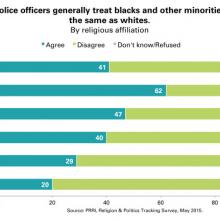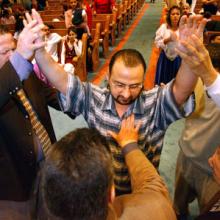Hispanics
For Catholics, the key to working collaboratively with Pope Francis, on issues from mass migration to climate change to Hispanic evangelization, may be found in a controversial movement that many left for dead long ago: liberation theology.
That message reverberated, from Feb. 6 to Feb. 10, through the halls of Boston College and a nearby retreat center, as nearly 40 theologians gathered from across the Spanish-speaking world to discuss the movement’s future with its founding figures.
The percentage of white Americans (46 percent) who believe blacks and other minorities receive equal treatment to whites in the criminal justice system is exactly the same as it was in 1992 — the year of the Rodney King riots in Los Angeles, according to the Public Religion Research Institute. In contrast, only 17 percent of black Americans and 39 percent of Hispanic Americans agree.
Death may be inevitable, but one in three Americans – including most blacks and Hispanics – want doctors to never quit fighting it.
And that number has nearly doubled in 23 years, a new survey finds.
In 1990, 15 percent of U.S. adults said doctors should do everything possible for a patient, even in the face of incurable illness and pain. Today, 31 percent hold that view, according to a report released Thursday by the Pew Research Center’s Religion & Public Life Project.
The majority of U.S. adults (66 percent) still say there are circumstances when a patient should be allowed to die. At the same time, however, the never-say-die view calling for nonstop aggressive treatment has increased across every religion, race, ethnicity, and level of education.
A new survey of Hispanic political and religious values finds they’re overwhelmingly Democrats who hold a largely negative view of the Republican Party.
The 2013 Hispanic Values Survey of 1,563 Hispanic adults was conducted online in both English and Spanish between Aug. 23 and Sept. 3. It has a margin of error of plus or minus 3.7 percentage points.
The survey found that most Hispanics are delighted with Argentine-born Pope Francis, but they hold slightly less favorable views of the Catholic Church. While nearly 69 percent look favorably on the pope, only 54 percent see the institution in a favorable light.
I have always loved baseball. Growing up on the mean streets of East Los Angeles, baseball was the one activity that kept me away from the pitfalls many young Latino males face on a daily basis. Summer days were spent—sunrise to sunset—in makeshift sandlots in the shadows of Dodger Stadium, fielding bad-hop grounders and striping screaming line drives. It was our neighborhood pastime.
On the occasion when enough coins were scraped up to venture into the venerable cathedral, Dodger Stadium, our baseball heroes paraded before us on this hallowed turf. Our childhood heroes were rarely categorized according to ethnicity and nation of origin but always according to the color of their uniform, Dodger Blue. It was the name on the front of the uniform that mattered, not the back.
As maturity set in and the complexity of national racial issues manifested themselves with the social unrest of the late 1960s, I came to a deeper understanding of the diverse and painful racialized world in which I lived. Baseball was not the safe and immune haven I had first imagined. I became aware of the once segregated Negro Leagues and the painful history of Jackie Robinson, the first Black player to integrate into the “major leagues.” I also realized that even in my English speaking, Mexican-American home, I too was not nationally normative. I was Mexican-American, Latino, Hispanic, Chicano (albeit, born in the United States) and spoke with a distinct accent that immediately identified me as such which, in this country, included labels like wetback, beaner, spic[!], etc.
It was about this time that my relationship with the national pastime took an interesting turn. As much as I wanted to focus on the name on the front of the uniform, I couldn’t help but notice the names on the back of the uniform. Cepeda, Clemente, Marichal, Tiant, and Concepción all became a part of my racialized purview. This realization came to full fruition with the onset of Fernandomania in the 1980s.
The high cost of anti-immigration laws. Why candidates' faith matters. ABC News' exclusive interview with President Obama. U.S. Hispanics choosing churches outside Catholicism. Three U.S. Congressmen tour the Canadian tar sands. Who are the death penalty's most ardent supporters? Investors worth a collective $20 trillion (with a T!) call for urgent action on climate change. And God's economy.
I admit it: A few years back, when I first heard about the E-Verify program, I thought it sounded reasonable. The program was described to me as a way for employers to voluntarily verify the U.S. citizenship of their employees by cross-checking their information with the online databases of the Department of Homeland Security and the Social Security administration. I knew that there were flaws in the system, which sometimes misidentified workers as undocumented even when they were not. However, I thought, what employer doesn't deserve the right to check the employment eligibility of his or her workers?
Welcome to the month of June. Did you know that May is considered Asian Pacific Heritage Month? Don't worry, most folks don't know or care either.
This week is significant in the lives of the more than 40 million Hispanics in the United States in that it marks the beginning of Hispanic Heritage Month.




